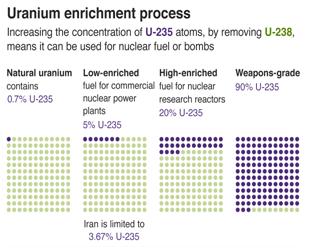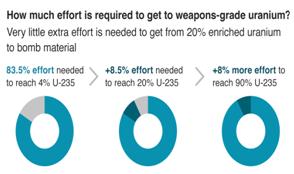

In a breach of the 2015 nuclear deal, Iran claims that it has resumed 20 percent uranium enrichment at Fordow site where activity was banned for 15 years.
Context
In a breach of the 2015 nuclear deal, Iran claims that it has resumed 20 percent uranium enrichment at Fordow site where activity was banned for 15 years.
About
- What is Uranium enrichment?
- Uranium found in nature consists largely of two isotopes, U-235 and U-238.
- Enriched uranium is produced by feeding uranium hexafluoride gas into centrifuges to separate out the most suitable isotope for nuclear fission, called U-235.
- Low-enriched uranium, which typically has a 3-5% concentration of U-235, can be used to produce fuel for commercial nuclear power plants.
- Highly enriched uranium has a concentration of 20% or more and is used in research reactors. Weapons-grade uranium is 90% enriched or more.
|
The deal
|
The concern
- The move is seen as a significant step toward achieving weapons grade levels of uranium.
- The higher levels raise fears that Iran will work toward building a nuclear weapon, which requires 90% enrichment.
- Iran’s move is its latest away from the nuclear deal as it seeks to pressure the other signatories, particularly those in Europe, to deliver on promises of sanctions relief.
- The United States pulled out of the deal in 2018 and instituted economic sanctions, especially targeting Iran’s key oil sector.




